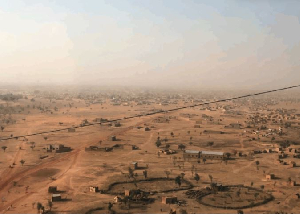“Peter, my mother has also passed away. We cannot immediately determine the cause of her death, but a witch doctor claims she was cursed over a family property”.
This is what a Junior High School (JHS) classmate of mine told me earlier this year after her mother passing. As the leader of our JHS year group, such information reaches me first.
Sadly, this was the third instance of the passing of four mothers of my friends within a span of 6months. The ages of these mothers averaged between 40 and 60 years.
Interestingly, they all resided in rural areas and used unclean cooking fuels for their daily family cooking. While I am not a health expert and cannot emphatically state what led to their deaths, I have been concerned about the possibility of unclean cooking fuels playing a role in their demise.
Unclean cooking fuels, also known as polluting fuels, include but are not limited to kerosene, firewood, and charcoal. Research has indicated that unclean cooking fuels have severe mental and physical repercussions on older adults. Common diseases associated with unclean cooking fuels include arthritis, osteoporosis, lung cancer, visual impairment, and premature death. Besides the health impacts of unclean cooking fuels, they also have adverse effects on the environment due to their contribution to climate change, and their emissions of black carbon into the environment.
In 2022, the World Health Organization 1 noted that over 6 million people die globally each year due to household air pollution resulting from unclean cooking fuels and ambient air and that about 2.4 billion people across the globe lack access to clean and healthy cooking fuels. The use of unclean cooking fuels is however widespread in poor households, accounting for approximately 80 percent of Sub-Saharan Africa.
In a recent study assessing the choice of cooking fuels in Ghanaian households, the researchers revealed that 18,000 people in Ghana die annually from the usage of unclean cooking fuels.
While unclean cooking fuels are used throughout Ghana, their usage is particularly prevalent in rural areas where there is easy access to firewood. Women and children, who have a traditional monopoly over cooking, collecting firewood, and other household chores, bear the greatest brunt of the debilitating health impacts of unclean cooking fuels. These routine activities also disproportionately affect the education of young girls in rural areas.
It is worth noting that, apart from cooking, women in rural areas are also exposed to unclean fuels and air pollution through palm oil production. Air pollution from the wastewater of small-scale palm oil production in some rural areas is so intense that being around such areas becomes challenging. In 2020, I witnessed the untimely death of a pregnant woman in her mid-thirties in a rural community in Ghana due to her overexposure to the heat and air pollution from crude palm oil production.
The Government of Ghana aims to reduce the usage of firewood and charcoal for cooking to below 30 percent by 2030 and improve the usage of Liquefied Petroleum Gas for cooking to 50 percent.
However, the urgency of the situation demands collective action from individuals, communities, governments, and organizations. By working together, we can create safer, healthier, and more sustainable environments for the women in rural areas of Ghana, allowing them to lead healthier lives and contribute to the development of their communities.
Opinions of Sunday, 20 August 2023
Columnist: Peter Dadzie
Are women in rural areas in Ghana cooking their way to death?
Entertainment














